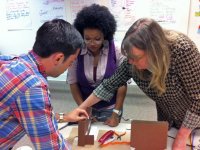How Teams Can Transform Schools
In order to lead your school toward the change you want to manifest, you need to first understand the essential nature of team building.
The Leadership Team at Tubman Middle School (a pseudonym) is transforming their underfunded, urban school into a place where kids thrive and succeed. How are they doing this? They meet weekly, the team's purpose is sharply defined, each member's role and responsibility is explicit and internalized, and they have articulated norms for working together, as well as norms for conflict. They also engage in healthy, productive conflict about ideas.
They also stay focused on their top goals and priorities (of which there are only two), assess the impact of what they do, and make changes when they see that certain actions aren't leading to their desired results. They learn together and make time for their own reflection.
The members of this leadership team also know that their team is a key vehicle to ensuring the efficacy of other teams -- of grade level and department teams, of the student success team, and of the restorative justice team. Collectively, they know that they have the potential to lead their community where it wants to go. And they remind themselves, regularly, of why this team needs to exist, why it needs to be strong and healthy, and of the role that teams can play in transforming a school.
Teams Are Essential to Interrupting Inequities
At Learning Forward's a couple of years ago, Professor Pedro Noguera delivered a keynote address on how to create equitable schools. He offered 10 equity practices that support the academic growth of all children and interrupt systemic inequities. After he concluded his prepared speech, the moderator asked, "What can people here do now? Tomorrow?" Dr. Noguera responded by urging us to find communities and to "build teams of people" who can take up this work. "We can't do it alone," he said.
This reminder is so simple yet so challenging: We can't do it alone. No individual alone can transform our schools into places where all children get what they need every day. Many of us are acutely aware of how much work needs to be done and of how far we are from an ideal of education. We might also be aware of our own individual limitations, including our capacity to do the amount of work that needs to be done and our individual scope of knowledge and skill set.
Teams have great potential for solving hard problems in challenging contexts. They bring together more skill, knowledge, and experience to work than any single individual can. They can integrate individual members' diverse contributions into a creative problem that is what is needed. Of course, as many of us know, teams can also go badly by not getting anything done or falling into groupthink. The challenge is to identify what it takes for teams to maximize their potential.
Some of us might suspect that we're stronger and more effective in teams, but we haven't had such an experience. Until we do, it can be hard to fully invest in building a team. We might be apprehensive about taking risks or trusting a leader. A team's leader needs to surface past experiences and beliefs about building teams to get buy-in to the process.
We Can Also Work Alone
Working in teams doesn't exclude the need to work alone at times, as well. Many people (especially introverts) need quiet, independent work time to effectively contribute to the greater whole. Teams can work interdependently and independently at the same time. For example, if a team of coaches is charged with designing and leading a three-day summer training, some of the planning might be collaboratively decided, and much of the planning might be done in pairs or by individuals.
The entire team may want to review plans after individuals have worked on them alone, but the actual planning of the work is sometimes best done individually. Every part of a team's work doesn't need to be done collaboratively with everyone sitting around the table.
A good indicator of team members trusting each other is that work can be divided up and people can go off and do parts of it alone or in pairs.
Team Development Equals Hard Work
Leading teams is hard. It's really complex and multi-faceted, and the skills required by team leaders or facilitators aren't usually explicitly taught. One pre-work step in leading a team is to be convinced of the role that teams can play in transforming schools. We have to really believe in something in order to throw ourselves into trying it out. But as I've witnessed at Tubman Middle School, it pays off.
